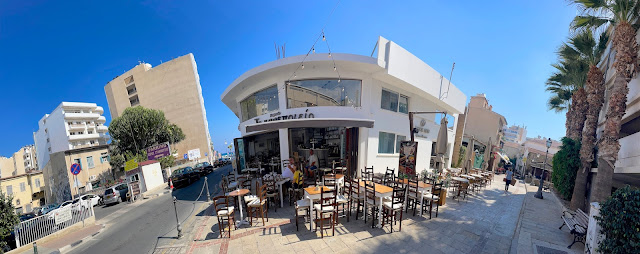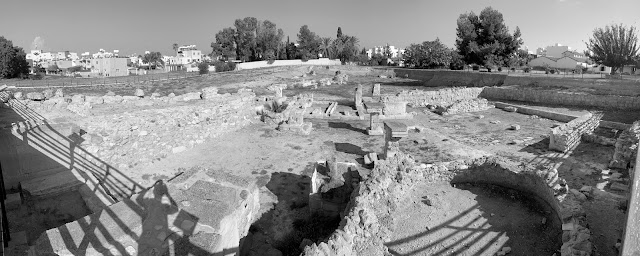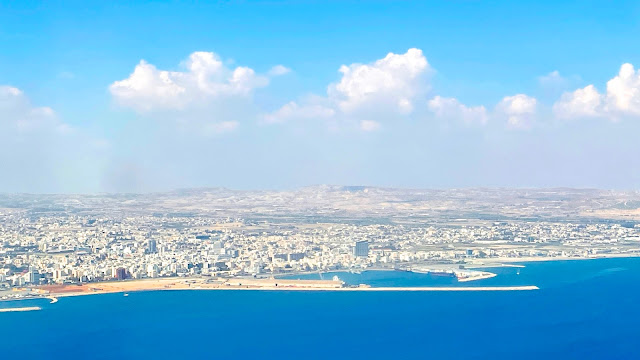Welcome to Cyprus - my 110th Full Member UN Country (out of a 193 Total) !!!
In this post I fly from Erbil in Iraqi Kurdistan to Larnaca in Cyprus via an overnight sleep under a couch in Amman Airport in Jordan !!! In this post I also pickup a hire car at Larnaca Airport and visit the city of Larnaca. At the end of this post, after the photos, I explain all about Cyprus.
Larnaca (Pop 84,900, Sea Level, Founded 13th Century BC) is known for its palm-tree seafront also called Finikoudes and its perfect balance between small city and seaside town. It is easy to visit and enjoy. The main beach is clear and clean and there is no shortage of souvlaki and fish tavernas. It is the perfect balance between a populated place and a relaxed seaside town.
After my 104th UN COuntry run in Larnaca along the beachside coast towards the airport, I visited the following places: 16th Century Castle, 680AD St Lazarus, 14th Century Mosque, 1200BC Ancient Kition, Parthena Farenomeni Church, Salt Lake and the 18th Century Ottoman Kamares Aqueduct. The Ancient Kition was a religious city founded by the Mycenaeans in the 1200s BC. The city was then taken over by the Phoenicians until 400BC when it was abandoned. The highlight of my visit was the 18th Century Church of St Lazarus that contains his skull and both arm bones. These are the relics of the friend of Christ and they are here in Larnaca.
Enjoy the sites of Larnaca…
ABOUT CYPRUS:
Cyprus, officially the Republic of Cyprus, is not only independent and not part of Greece but is still a member of the Commonwealth, despite having a President as its head of state !!! It is also a member of the European Union. It is located in a highly strategic position – under Turkey and next to Syria. The Turks invaded of the north of Cyprus in 1974 and has occupied it ever since. For this reason I am not visiting the Turkish part of Cyprus. But more on this later.
The earliest known human activity on the island dates to around the 10th millennium BC. Archaeological remains from this period include the well-preserved Neolithic village of Khirokitia, and Cyprus is home to some of the oldest water wells in the world. Cyprus was settled by Mycenaean Greeks in two waves in the 2nd millennium BC. As a strategic location in the Eastern Mediterranean, it was subsequently occupied by several major powers, including the empires of the Assyrians, Egyptians and Persians, from whom the island was seized in 333 BC by Alexander the Great. Subsequent rule by Ptolemaic Egypt, the Classical and Eastern Roman Empire, Arab caliphates for a short period, the French Lusignan dynasty and the Venetians was followed by over three centuries of Ottoman rule between 1571 and 1878.
Cyprus was placed under the United Kingdom's administration in 1878 following freedom from the Ottomans but ongoing instability between Greeks and Turks living in Cyprus during and before the Ottoman occupation. Archbishop Makarios led a campaign to reunite Cyprus with Greece but the Turks apposed it vehemently preferring the British remain. Eventually the UK gave Cyprus its independence in 1960 but the Turks persisted and in 1974 staged an invasion and claimed northern Cyprus. Many believe the British allowed this to happen to enable the UK to keep its eye both on mainland Turkey, Syria and the rest of the Middle East running down the Mediterranean.
The top exports of Cyprus are: Passenger and Cargo Ships, Packaged Pharmaceuticals, Refined Petroleum, Cheese and Copper Ore. Tourism is on the rise and many Russian millionaires and billionaires are buying up whatever property they can get their hands on. The other interesting fact about Cyprus is that it is critically short on water – that is why there are 102 dams to try and capture as much rainwater as possible given limited melting snow and underground water.
Finally Greece Greeks and Cypriot Greeks are the same and different. Same because they both originate from the Hellenic and Greek Empires and the language was the same before Greeks occupied Cyprus. Different because very noticeable differences between them in language, food, music and dress. Many words are different and not just pronounced differently and when it comes to food there are many pastries and dishes that exist in Cyprus but not Greece. The good news is that these differences are not enough for a Greece Greek to feel different from a Cypriot Greek.






















No comments:
Post a Comment